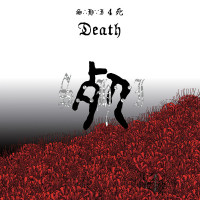Cherry Nishida, vocalist and mastermind behind Struggling Harsh Immortals, really hates existence. “The world being cursed / there is nothing good here” he howls on the opening lines of S.H.I.’s fourth release, and first stateside venture.
Death follows this theme on almost every track. “You think I’m crazy / but this is crazy word,” he announces on “Terminus,” Or there’s “Doesn’t mean that much” where he says, “Your life so painful / and lot of tears / They won;t do you anything you require / and they won’t feel anything.” But what’s interesting is that while Nishida speaks from a wounded position - the world doesn’t care about pain, this place is evil and there’s nothing we can do - the music is downright aggressive. Gone is the, perhaps, playful, imagery from his first mainstay band, the legendary Zouo, and now there is just self-serious anger. Though, with all the tragedy going on in the world (is it worse now than, say 40 years ago, or are we just better informed?) you can’t disagree with him.
Of course, Nishida is a native Japanese speaker, so it is remarkable at how economical he is with English language words. There’s not much fancy poetry, but there is direct commentary, which is sometimes roared and sometimes ranted. If anything, it shows how dedicated Nishida is to his anti-life belief. Though, surprisingly, at times, he seems to suggest that the misery of this existence os just the next step before the cycle of life begins. “The voice of the body arrives again / you are born again,” he says at one part. At another: “No one one lives forever… but Lazarus come out again.” As with Zouo, it’s interesting how Nishida blends Judeo-Christian concepts with Japanese belief and folklore… and there might even be some gnonstic twisting in here too. If anything, Nishida has taken barbs from all over the amp and has bolted to what ius essentially a hardcore punk band to make the release as nasty, and as complex, as possible.
In fact, the credits state that S.H.I. is a band of ten people, though “only” eight appear on the release. The fear there is that everyone might want to jam all the time, thereby reducing raw power into a tangled messy web of noise. That doesn’t happen, thankfully. Instead, hardcore punk/thrasy guitars lead the way here, with the various members filling in here or there. The additions give the record a sort of experimental depth. There are a lot of synth and digital sounds added. Some of the beat driven digital additions don’t hit the mark, but when the group adds a Chrome or Psychic TV ambient buzz, the record becomes more chaotic and more original. Despite the bells and whistles here, the band seems more interested in being direct than “experimenting,” so the album, at its core, is punk.metal with some diversions added to make the release unique.
And it is unique. And it does stand out. If we look back to Zouo, it wasn’t always clear if the band was serious, if there was a translation issue, or if there was a bit of theatre at play. Here, Nishida and crew are totally in control, and perhaps surprisingly, totally direct in their message. But, where spelling everything out could have made the release boring, it actually opens up more puzzles in the record itself, and those puzzles extend back Zouo and the post-Zouo Danse Macabre. It feels like Nishida has been working towards this summit since 1984 and it’s one hell of a view up there.
